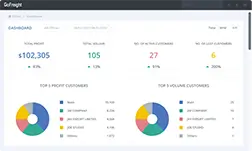Wading through all of the different software for freight brokerage companies can be challenging, especially if you aren’t quite sure how to narrow down your options. This decision, however, has the potential to make or break your business. Whether you manage to streamline your freight brokerage operations and improve productivity, or you end up wasting valuable time and money all depends on the freight management system your company chooses.
Working in the freight brokerage industry is chaotic enough with all of the moving pieces companies have to juggle at once. Luckily, leading software for freight brokerage companies has made the process more seamless. By increasing automation and conveniently centralizing information, top-of-the-line technology allows forwarders to analyze key data and capitalize on unprecedented visibility. In order to make sure you pick the ideal software for your freight brokerage company, there are some important factors you need to consider first.
Here’s what you should be on the lookout for when you start your search:
Functionality
The functionality behind software for freight brokerage companies is one of the most important things to assess as you research different solutions. You want to go with a freight management system that will have the features that are crucial for your unique broker services. You also want software that’s capable of enhancing your workflows. Freight brokerage technology is ultimately supposed to increase your organization’s efficiency, but every company has its own set of specific needs.
Some of the most common functionalities of software for freight brokerage companies include:
1. Automated quotes and bookings
Advanced brokerage software can automatically send the details of your freight to various carriers, which will help you identify the logistics partner that’s best suited to handle your shipments. It can also reserve open spots for customers who want to book orders instantly online as well as prepare the necessary shipping documentation ahead of time.
2. Real-time container tracking
It’s critical to know where your freight is and when it will arrive. Keep in mind that all freight management systems don’t have the same level of real-time tracking capabilities. For example, software with basic tracking functions may still require you to manually add and check freight location information. More sophisticated software, however, can notify you and your customers of important updates without any effort on your part.

3. Compatibility with third-party systems
Some freight broker software may need additional support from third-party financial systems, which is why you should verify whether or not the technology can be easily integrated with other software. It’s critical that forwarders trust the reliability of their freight management systems because no one wants to be stuck with something that’s a nightmare to implement.
4. Inventory management
Freight brokerage companies have to keep up with a ton of freight moving through their warehousing facilities. Larger forwarders can especially benefit from the software with an inventory management system that will prevent any shipments from getting lost in the mix, improve the use of the space in their warehouses, and get their freight to carriers on time.
By creating a list of functions like these that your freight brokerage company needs to maintain efficient operations, you can choose the best software for your business. If you’re still not sure about a product even after you examine the functionality, most vendors will typically offer a free demo. You can also always request one as a way to ensure you’re picking one that will address your organization’s primary concerns.
User-friendly
One feature that differentiates the top-tier brokerage platforms from the mediocre competition is an intuitive user interface. Great software should be accessible and easy for your customers and employees to understand. If your freight management system isn’t user-friendly, you’ll most likely push potential business to your competitors.

Scalability
Your freight broker software should be capable of scaling with your business. As you experience opportunities for growth, it’s helpful to have the optimal processes and appropriate analytics that will enable you to expand your services to customers.
Security
In today’s technological world, hackers (unfortunately) pose a major threat to data security. As freight broker software continues to evolve, it’s crucial that companies prioritize having extra security features that will safeguard cloud-based information. Without multiple layers of 24/7 protection, your company could face shutdowns that would not only put your customers’ sensitive information at risk but also your bottom line.
Analytical tools
Software for freight brokerage companies should be well-equipped with analytical tools that can monitor the flow of your revenue and assess the information you consider most valuable. For instance, tools that offer insights into data like profit per shipment can help reveal specific problem areas that may require more attention.

Investing a little into the right software for your freight forwarding company can go a long way. Don’t take too much time to debate over this decision, however, because you’ll only get left behind by the competition. Once you integrate a solution that’s capable of managing all of your forwarding needs, the ROI will follow.





